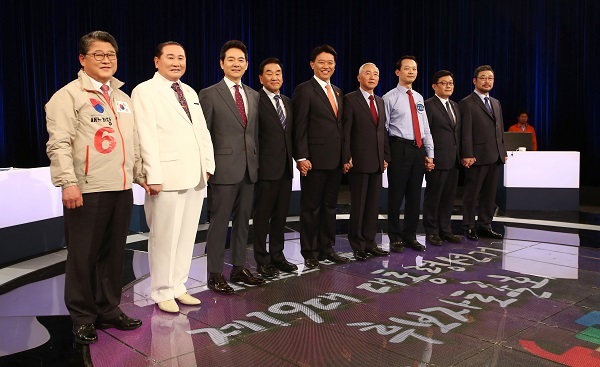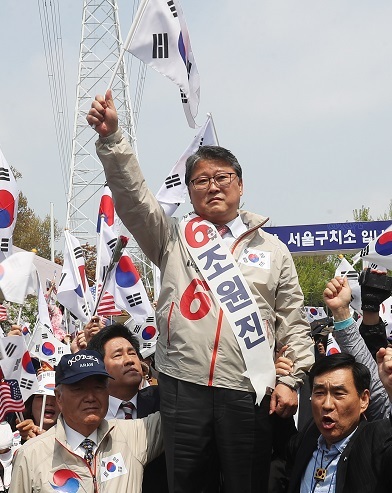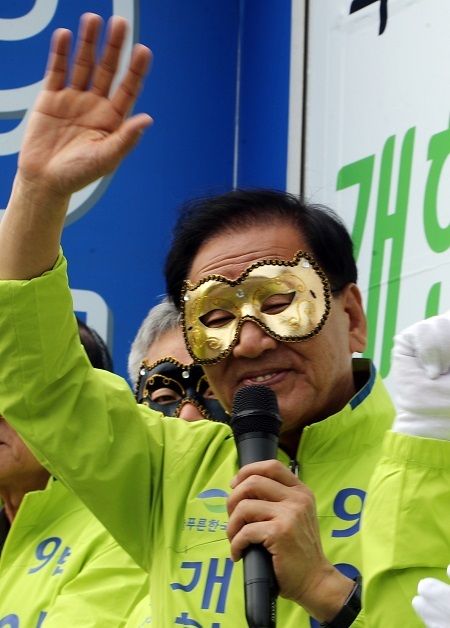[Newsmaker] Underdogs struggle to stand out in crowded field
By Korea HeraldPublished : April 25, 2017 - 16:16
Unlike their top-tier rivals, minority candidates for the upcoming May 9 presidential election have focused on promoting their respective profiles and slogans to the political audience, wasting little time on attacking one another.
Instead of offering a comprehensive vision, they have tended to limit their campaigns to a specific areas to underline their signature policies.
Instead of offering a comprehensive vision, they have tended to limit their campaigns to a specific areas to underline their signature policies.

The underdog candidates -- ranked from No. 6 to No. 15, except No. 13 who resigned last week -- attended a televised speech hosted by the National Election Broadcasting Debate Commission late night Monday.
Among them, one was an independent candidate while the others were affiliated with minor political parties that either hold less than five parliamentary seats or failed to obtain 3 percent or more in the last election. They were therefore unqualified to participate in the main debates, which five candidates qualified for this year.
Taking the lead among this lower-tier group were those with political experience -- pro-Park Geun-hye lawmaker Cho Won-jin, left-wing former lawmaker Kim Sun-dong, former spy agency chief Nam Jae-joon, and former senior conservative lawmaker Lee Jae-oh.
“Those seeking to establish a leftist government held fake candlelight rallies to frame former President Park,” said the pro-Park candidate Cho, vowing to review the Choi Soon-sil corruption scandal which led to Park’s ouster.

As a steady participant in the pro-Park rallies, Cho has been receiving a positive response from small groups of Park supporters. He was also one of the few Park loyalists who regularly visited Park’s private house in Samseong-dong before she was detained on corruption charges.
“(Leading conservative) candidates Yoo Seong-min and Hong Joon-pyo won’t even make it to the 10 percent mark and will end up facing the judgment of conservative voters,” he claimed.
“The only way to defeat (liberal front-runner) Moon Jae-in is for the conservative camp to unite and field me as sole candidate.”
Reflecting his effort to appeal to the pro-Park conservative voter pool, Cho named his new party Saenuri, taking the former name of the current Liberty Korea Party.
Standing at odds with the conservative Cho was Kim Sun-dong, former leadership member of the now-defunct Unified Progressive Party -- a far-left group which was disbanded in 2014 for conspiring against the government.
Kim pledged to motion a special law to promote temporary employees to regular workers and to establish the Ministry of Youth to respond to college fees and youth unemployment issues.
For a while, the two figures conflicted over the nature of the anti-Park candlelight protests which swept across the nation late last year, Cho saw them as pro-North Korea rallies seeking a change of power and Kim accused the pro-Park groups of ignoring justice.

Lee Jae-oh, formerly a fifth-term lawmaker and a ranking aide to former conservative President Lee Myung-bak, used the floor to propose a motion to revise the nation’s Constitution.
“If I become president, I shall reform the nation, revise the Constitution, realign the constituencies, and then resign within a year,” he said.
His key idea is to change the current five-year, single-term presidency to a four-year, double-term one and to build a decentralized state power model. According to his vision, the central government will be co-steered by the president and prime minister, with the former taking charge of external state affairs and the latter of domestic affairs.
“I will reduce the number of parliamentary seats by 100 and eliminate municipal council elections, and use the related funds to pay a monthly fund to war veterans,” Lee also said.
Nam, former chief of the National Intelligence Service, came up with more radical pledges such as disbanding the National Assembly upon a referendum or replacing the proportional representative system with a vocational representation.
He also vowed to deploy nuclear armament against plausible military provocations against North Korea and to increase the range of the Terminal High Altitude Area Defense, a disputed US-led anti-missile battery to be deployed in the southern party of the country.
Joining Nam in his military-focused initiative was TV anchor-turned-politician candidate Jang Sung-min, while Lee Kyung-hee underlined a peaceful inter-Korean unification and Kim Min-chan vowed to build a cultural hub city in the Demilitarized Zone.
By Bae Hyun-jung (tellme@heraldcorp.com)
-
Articles by Korea Herald







![[Graphic News] More Koreans say they plan long-distance trips this year](http://res.heraldm.com/phpwas/restmb_idxmake.php?idx=644&simg=/content/image/2024/04/17/20240417050828_0.gif&u=)
![[KH Explains] Hyundai's full hybrid edge to pay off amid slow transition to pure EVs](http://res.heraldm.com/phpwas/restmb_idxmake.php?idx=644&simg=/content/image/2024/04/18/20240418050645_0.jpg&u=20240419100350)






![[From the Scene] Monks, Buddhists hail return of remains of Buddhas](http://res.heraldm.com/phpwas/restmb_idxmake.php?idx=652&simg=/content/image/2024/04/19/20240419050617_0.jpg&u=20240419175937)

![[KH Explains] Hyundai's full hybrid edge to pay off amid slow transition to pure EVs](http://res.heraldm.com/phpwas/restmb_idxmake.php?idx=652&simg=/content/image/2024/04/18/20240418050645_0.jpg&u=20240419100350)

![[Today’s K-pop] Illit drops debut single remix](http://res.heraldm.com/phpwas/restmb_idxmake.php?idx=642&simg=/content/image/2024/04/19/20240419050612_0.jpg&u=)